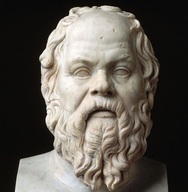CRITO
|
|
In Plato's dialogue, Crito, Socrates is in prison with only a short time to live before he is put to death by the city of Athens. He is visited by his dear friend, Crito, who tries to persuade Socrates to flee from prison while he has the chance. What we have in this dialogue is another wonderful illustration of the Socratic method in action. Socrates is willing to escape, provided that Crito can present him with solid arguments in support of such behavior. After Crito's "arguments" are demonstrated to be inadequate, Socrates comes up with his own series of arguments supporting the idea that he should remain in prison and await his fate.
|
|
As you read, be sure that you are able to answer the following questions:
|
|
Select one of the following question to reflect upon after having gone through all of the above steps:
|
© Michael S. Russo, 2013. All of the content on this webpage is copyright. The materials on this webpage may not be modified, posted or transmitted without the prior consent of the author. Permission is granted to print out copies for educational purposes and for personal use only. No permission is granted for commercial use.



